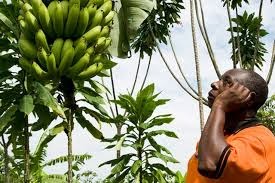Embrace ICT tools to improve agriculture
Lazarus Sauti
Agriculture is an
important sector involving the majority of the rural population in Africa. This
sector faces major challenges in enhancing production in situations of
dwindling natural resources and lack of financial support.
Therefore, Africans
should learn a lot from other countries which have embraced ICTs to foster the
use of technology in agriculture.
Josh Woodard, project manager at Family Health International 360 where
he manages USAid’s Facet project, which focuses on ICT and agriculture in sub-Saharan Africa, once
asked, “Information and
communication technologies for climate change and agriculture are developing
fast, but how do they fit into the big picture?”
Woodard was asking about the impact of ICT tools in cutting carbon
emissions and improving agriculture.
To help answer the question, Woodard provided a background: “Greenhouse
gases from agriculture account for more than 10 percent of total emissions
globally, roughly equivalent to the entire global transport sector.
“Meanwhile, it is estimated that agricultural production will need to
increase by about 70 percent by 2050 to keep pace with global population
growth.”
He goes on to say: “What is more, the real impacts of climate change on the
agricultural sector are likely going to be hardest felt in many of those
countries whose people rely on agriculture most for their livelihoods.
“In sub-Saharan Africa (SSA) and south Asia, for example, some estimates
show a reduction in the productivity of most major food crops as a result of
changes to the climate over the next 40 years.”
The good news, according to Woodard, is that affordable technologies that
have the potential to reduce greenhouse gases and increase productivity in
agriculture are becoming more widely available.
“I am referring not to agricultural technologies - although those certainly
play a role - but to information and communications technologies, like the mobile phone, video and radio,” he said.
This means countries within and across the great African continent should
embrace information and communication tools to cut emissions and in the process
improve agriculture.
The challenge is that not all farmers know about ICT tools. So how do ICTs change
this?
The answer is simple.
ICT has the potential
to improve the livelihoods of small-scale farmers and the efficiency of the
agricultural sector in developing countries.
This includes the use
of computers, internet, geographical information systems, mobile phones, as
well as traditional media such as radio or television in dissemination of
information to the farmers and buyers.
Thus, ICTs make it easier to share locally relevant information on improved
techniques and to provide time-specific information and recommendations (such
as weather forecasts, and when to do what).
Woodard notes: “As mobile phone penetration rates continue to grow at a
rapid rate throughout the globe, farmers are gaining access to a growing number
of agricultural information services both through SMS and voice.”
In addition to mobile phone services, a growing number of agricultural
organisations and agribusinesses have been using low-cost video equipment to
create locally-made extension videos to share the stories of farmers who have
switched to more sustainable practices with their peers in other communities.
Increasing the
efficiency, productivity and sustainability of small-scale farms is an area
where ICT can make a significant contribution in Africa.
Farming involves risks
and uncertainties, with farmers facing many threats from poor soils, drought,
erosion and pests.
Key improvements therefore
stem from information about pest and disease control, especially early warning
systems, new varieties, new ways to optimise production and regulations for
quality control.
To effectively embrace ICTs to improve agriculture in Africa, governments
should invest in ICTs and encourage farmers to take advantage of the potential
impact of ICTs.
Furthermore, stakeholders in agriculture should work hard to create content
that is relevant to Africa and her citizenry.
Woodard noted this important requirement and comments, “While ICTs can
support the transition to more sustainable agricultural practices, they still
require someone to create high quality and relevant content, and someone to pay
for the dissemination of that information.”
It is also important
for stakeholders in agriculture to ensure that data is available on time. This
data should be available in electronic format on portals and platforms where it
can be accessible by the farmers.
Economies of scale can
be realised through the use of shared platforms using common standards.
Messages through videos in local languages have proved to be effective.
Combining old and new
media is most successful, such as videos of good practices, rural theatre,
television and radio broadcasts, which all provide input for local innovation.
Africa and her
citizenry has a lot to learn from other agricultural projects across the world,
particularly in countries like India, Uganda, Kenya, Ghana and Bolivia which
have embraced ICTs.
With the increased
penetration of mobile telecommunication technologies into the rural areas,
Africans should see an increased use of technology to foster agriculture growth
and bring prosperity to many rural Africans.

Comments
Post a Comment